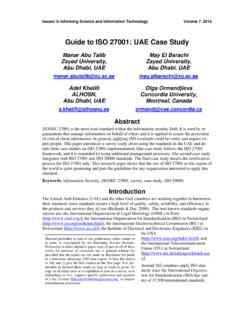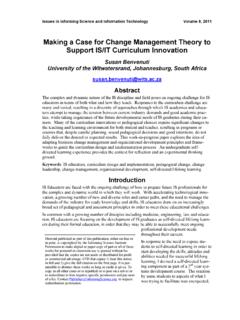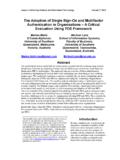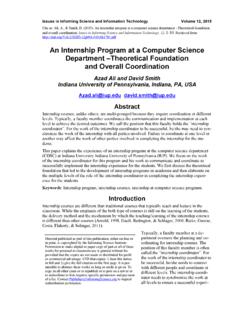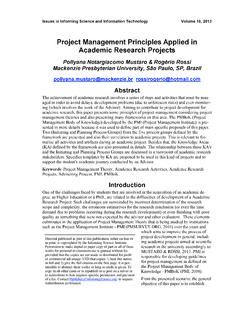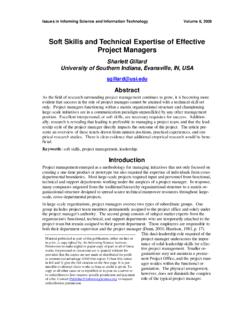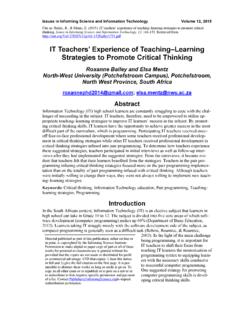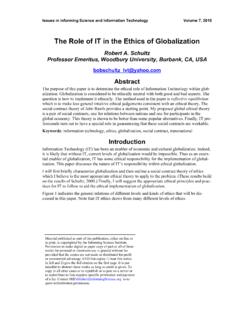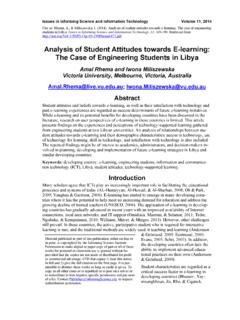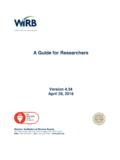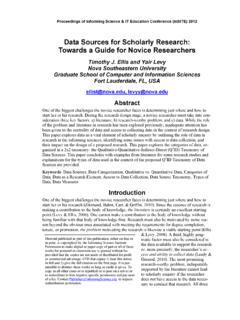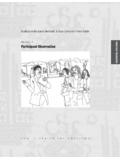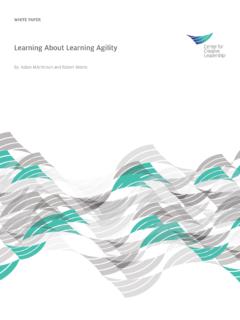Transcription of Towards a Guide for Novice Researchers on …
1 Issue s in Informing Science and Information Technology Volume 6, 2009. Towards a Guide for Novice Researchers on Research Methodology: Review and Proposed Methods Timothy J. Ellis and Yair Levy Nova Southeastern University Graduate School of Computer and Information Sciences Fort Lauderdale, Florida, USA. Abstract The Novice researcher , such as the graduate student, can be overwhelmed by the intricacies of the research methods employed in conducting a scholarly inquiry. As both a consumer and producer of research, it is essential to have a firm grasp on just what is entailed in producing legitimate, valid results and conclusions. The very large and growing number of diverse research approaches in current practice exacerbates this problem. The goal of this review is to provide the Novice re- searcher with a starting point in becoming a more informed consumer and producer of research.
2 Toward addressing this goal, a new system for deriving a proposed study type is developed. The PLD model includes the three common drivers for selection of study type: research-worthy prob- lem (P), valid quality peer-reviewed literature (L), and data (D). The discussion includes a review of some common research types and concludes with definitions, discussions, and examples of various fundamentals of research methods such as: a) forming research questions and hypotheses;. b) acknowledging assumptions, limitations, and delimitations; and c) establishing reliability and validity. Keywords: Research methodology, reliability, validity, research questions, problem directed re- search Introduction The Novice researcher , such as the graduate student, can be overwhelmed by the intricacies of the research methods employed in conducting a scholarly inquiry (Leedy & Ormrod, 2005).
3 As both a consumer and producer of research, it is essential to have a firm grasp on just what is entailed in producing legitimate, valid results and conclusions. The very large and growing number of di- verse research approaches in current practice exacerbates this problem (Mertler & Vannatta, 2001). The goal of this review is to pro- M aterial published as part of this publication, either on-line or vide the Novice researcher with a start- in print, is copyrighted by the Informing Science Institute. ing point in becoming a more informed Permission to make digital or paper copy of part or all of these consumer and producer of research in works for personal or classroom use is granted without fee the form of a lexicon of terms and an provided that the copies are not made or distributed for profit or commercial advantage AND that copies 1) bear this notice analysis of the underlying constructs in full and 2) give the full citation on the first page.
4 It is per- that apply to scholarly enquiry, regard- missible to abstract these works so long as credit is given. To less of the specific methods employed. copy in all other cases or to republish or to post on a server or to redistribute to lists requires specific permission and payment Scholarly research is, to a very great of a fee. Contact to request extent, characterized by the type of redistribution permission. Guide for Novice Researchers on Research Methodology study conducted and, by extension, the specific methods employed in conducting that type of study (Creswell, 2005, p. 61). Novice Researchers , however, often mistakenly think that, since studies are known by how they are conducted, the research process starts with deciding upon just what type of study to conduct. On the contrary, the type of study one conducts is based upon three related issues: the problem driving the study, the body of knowledge, and the nature of the data available to the researcher .
5 As discussed elsewhere, scholarly research starts with the identification of a tightly focused, lit- erature supported problem (Ellis & Levy, 2008). The research-worthy problem serves as the point of departure for the research. The nature of the research problem and the domain from which it is drawn serves as a limiting factor on the type of research that can be conducted. Nunamaker, Chen, and Purdin (1991) noted that It is clear that some research domains are sufficiently nar- row that they allow the use of only limited methodologies (p. 91). The problem also serves as the guidance system for the study in that the research is, in essence, an attempt to, in some man- ner, develop at least a partial solution to the research problem. The best design cannot provide meaning to research and answer the question Why was the study conducted,' if there is not the anchor of a clearly identified research problem.
6 The body of knowledge serves as the foundation upon which the study is built (Levy & Ellis, 2006). The literature also serves to channel the research, in that it indicates the type of study or studies that are appropriate based upon the nature of the problem driving the study. Likewise, the literature provides clear guidance on the specific methods to be followed in conducting a study of a given type. Although originality is of great value in scholarly work, it is usually not rewarded when applied to the research methods. Ignoring the wisdom contained in the existing body of knowledge can cause the Novice researcher , at the least, a great deal of added work establishing the validity of the study. From an entirely practical perspective, the nature of the data available to the researcher serves as a final filter in determining the type of study to conduct.
7 The type of data available should be considered a necessary, but certainly not sufficient, consideration for selecting research methods. The data should never supersede the necessity of a research-worthy problem serving as the anchor and the existing body of knowledge serving as the foundation for the research. The absence of the ability to gather the necessary data can, however, certainly make a study based upon research methods directly driven by a well-conceived problem and supported by current literature com- pletely futile. Every solid research study must use data in order to validate the proposed theory. As a result, Novice Researchers should understand the centrality of access to data for their study success. Access to data refers to the ability of the researcher to actually collect the desired data for the study. Without access to data, it is impossible for a researcher to make any meaningful conclusions on the phenomena.
8 Novice Researchers should be aware that their access to data will also imply what type of methodology they will be using and what type of research, eventually they will conduct. Figure 1 illustrates the interaction among the research-worthy problem (P), the existing body of knowledge documented in the peer-reviewed literature (L), and the data avail- able to the researcher (D). The research-worthy problem (P) serves as the input to the process of selecting the appropriate type of research to conduct; the valid peer-reviewed literature (L) is the key funnel that limits the range of applicable research approaches, based on the body of knowl- edge; the data (D) available to the researcher serves as the final filter used to identify the specific study type. The balance of this paper explores the constructs underlying scholarly research in two aspects.
9 The first section examines some of the types of studies most commonly used in information sys- tems research. The second section explores vital considerations for research methods that apply across all study types. 324. Ellis & Levy Research-worthy problem Valid peer-reviewed literature Data available Study type Figure 1. The PLD Model for Deriving Study Type Types of Research There are a number of different ways to distinguish among types of research. The type of data available is certainly one vital aspect (Gay, Mills, & Airasian, 2006; Leedy & Ormrod, 2005);. different research approaches are appropriate for quantitative data precise, numeric data derived from a reduced variable than for qualitative data complex, multidimensional data derived from a natural setting. Of equal importance is the nature of the problem being addressed by the research (Isaac & Michael, 1981).
10 Some problems, for example, are relatively new and require Table 1: Key Categories of Research Approach Most common type of data Stage of problem Categories of Theory Experimental Quantitative Evaluation Testing or revising Causal-comparative Quantitative Evaluation Testing or revising Historical Quantitative or Qualitative Description Testing or revising Developmental Quantitative and qualitative Description Building or revising Correlational Quantitative Description Testing Case study Qualitative Exploration Building or revising Grounded theory Qualitative Exploration Building Ethnography Qualitative Descriptive Building Action research Quantitative and qualitative Applied exploration Building or revising 325. Guide for Novice Researchers on Research Methodology exploratory types of research, while more mature problems might better be addressed by descrip- tive or evaluative (hypothesis testing) approaches (Sekaran, 2003).
